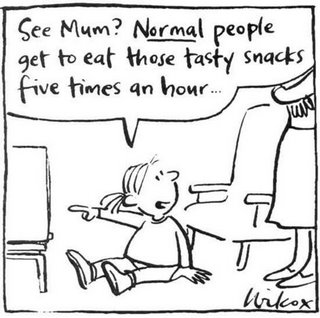Childhood obesity: Can an advertising ban solve the problem?
 A report from the Department of Health in October revealed that the UK is now the fattest country in Europe. The latest government warnings have warned that 12 million people in the UK will be obese by 2010 and, of that number, 1 million are expected to be children. This could lead to tens of thousands of children being affected by Type 2 diabetes that, until recently, was only seen in adults. The concern then is that we will see a generation suffering from a drop in life expectancy as they develop the serious complications of the disease. And this is just one problem that such children could face.
A report from the Department of Health in October revealed that the UK is now the fattest country in Europe. The latest government warnings have warned that 12 million people in the UK will be obese by 2010 and, of that number, 1 million are expected to be children. This could lead to tens of thousands of children being affected by Type 2 diabetes that, until recently, was only seen in adults. The concern then is that we will see a generation suffering from a drop in life expectancy as they develop the serious complications of the disease. And this is just one problem that such children could face.Due to this growing problem, the government has been taking steps to tackle the issue and have been busy putting together an anti-obesity marketing campaign which was scheduled to launch in the autumn. The campaign aims to raise awareness of the health risks of obesity while providing information and support for living healthier lifestyles in relation to diet and physical activity. However, the campaign has now been put back several months and will not be launched to the public until January 2007.
Still, the government are up against stiff competition from junk food companies who have millions of pounds worth of marketing budgets. These companies are seen by many to exploit vulnerable groups such as children and adolescents. This has led to a call for a reduction in marketing pressure, particularly to children, from the World Health Organisation. In the lead up to their next conference in Turkey later this month, European health ministers have been asked to sign up to an anti-obesity charter stating that children should not be exploited by food companies. It is expected the charter will be adopted at the event.
Professor Phil James from the International Association for the Study of Obesity has also added to the argument, expressing concern that parents' attempts to limit their children's intake of junk foods is "sabotaged" by clever marketing. The professor exerted that it was well recognised that such companies used child psychologists to "manipulate" the desires of children beyond the influence of their parents and commercially, it has been very successful. He has therefore joined this growing number of protestors calling for a ban on advertising junk food to children and a complete ban of unhealthy foods before the 9pm watershed.
Elsewhere in Europe, there has already been statutory bans placed on advertising (Norway and Sweden), guidelines put in place (Finland and Ireland) and self-regulation by the advertising and media industries (Netherlands, Portugal and Spain). And, in France, all adverts for processed foods or products with added fat, sweeteners or salt have to carry a health warning, or the advertiser must help fund health campaigns. So, why is progress in Britain still so sluggish?
The broadcasting regulator Ofcom recently commissioned Opinion Leader Research to investigate views on television advertising to children for food and drink products. Comprising a series of workshops with adults, adolescents aged 12-15 and children between 8 and 11, the research found that the public did not support a total ban on advertising junk food to children, but thought that there should be some restrictions. Respondents did support a ban on adverts aimed at children under five and the introduction of a timing restriction on foods high in fat, salt and sugar. But, this was not seen as a complete solution since adverts would still be able to run at peak viewing times for children. The research also highlighted that parents felt that celebrities, cartoon characters and promotional offers should not be featured in advertisements targeted at young children, at any time. Ofcom will now have to make a decision on what restrictions they would recommend.
But what should be done? Although I would agree that limiting junk food marketing has a large part to play in tackling the problem, as the research supports, this will only go so far to fight the crisis. Perhaps, as other research into consumer attitudes to diet and health from Nunwood suggests, manufacturers should realise the role they play and act more responsibly. A tax on junk food similar to that placed on cigarettes may also help to curb their consumption.
I do not doubt that it is a problem that must be tackled from a variety of angles and hopefully as we enter into 2007 progress will begin to be made. Ultimately, it is down to consumers to take action to improve their own diets, but with help from the government and manufacturers, this change can be made a lot easier. Here's to a healthier New Year when it comes.
Labels: Current Affairs



0 Comments:
Post a Comment
<< Home